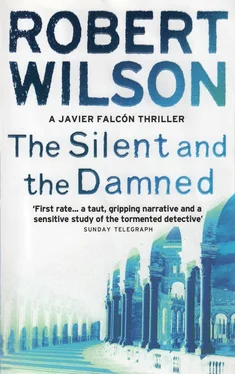He found Ferrera, gave her Salvador Ortega's details and told her to speak to someone in the Narcotics squad. A current address was all he wanted. He also told her to check all post offices in the Seville area to see if either Rafael Vega or an Argentinean called Emilio Cruz held a postbox for receiving mail.
'Is this more important than Rafael Vega's key?'
'Did you get anywhere with that?'
'He doesn't have a safe-deposit box in the Banco de Bilbao. That was as far as I got.'
'Work on the key later,' he said. 'It'll take time.'
He picked up his notebook and walked slowly up the stairs to the second floor where Ramírez stood with a master key for Montes's office. The members of GRUME were lined up in the corridor, waiting. Felipe came up from the car park sweating with his camera.
Ramírez opened the door. Felipe took his shots and left. Falcón shut the window. They looked around, sweating, while the air conditioning reasserted itself. On Montes's desk was a sheet of notepaper covered in his handwriting and a sealed envelope addressed to his wife. Falcón and Ramírez moved round to read the writing on the notepaper, which was addressed to 'My Fellow Officers':
It probably seems ridiculous to you that I should have taken my own life so close to retirement. I should have been able to bear the pressure of my job for a little longer, but I could not. This is no reflection on the men and women with whom it has been my honour to work.
I joined the police force with the belief that I could do some good. I had a strong sense of the value of the policeman in society. I have not been able to do the good that I intended. I have felt increasingly powerless to act against the new waves of depravity and corruption which are now sweeping through my country and the rest of Europe.
I have been drinking, hoping that it would dull my senses to what was happening around me. I did not succeed. A growing oppression has weighed down on my shoulders until at times I have felt unable to rise from my chair. I have felt trapped and unable to speak to anyone.
I only ask that you, my friends, protect my family and forgive me for this last disastrous act of mine.
Falcón read the letter out to the squad members crowding the door. The women cried open-eyed, staring in disbelief. He asked if someone who knew Sra Montes would accompany Ramírez to give her the letter and break the news to her personally. Montes's number two stepped forward and he and Ramírez left.
There was nothing of interest in the office and the interviews with the various members of the squad, who were all shaken, were monosyllabic. By the time he'd finished, Ramírez was back, having left the inspector of GRUME with Sra Montes. They sealed Montes's office and went back down to their own, where Cristina Ferrera was on the phone. Falcón told her to check for postboxes in the name of Alberto Montes as well. She nodded and scribbled down the name.
Ramírez followed him into his office and they stood at the window overlooking the car park, which was already clean and dry.
'You think Montes was on the take?' asked Ramírez.
'Some of the words he used in his letter were interesting,' said Falcón. 'Like: "I have not been able to do the good I intended", "powerless against corruption", "growing oppression", "trapped" and finally the phrase that really drew my attention: "protect my family". Why should anybody say anything like that? "Look after" maybe, but "protect"? This was a guy whose subconscious was leaking into his everyday life and he couldn't bear it.'
Ramírez nodded and stared into the car park, imagining himself crumpled, corrupted, damaged beyond repair. The man discarded from life.
'You didn't get the idea that he was on the take from that letter,' said Ramírez. 'So what else do you know?'
'I don't know what I know.'
'Don't start with that shit.'
'I mean it. I think Montes thought I knew something,' said Falcón.
'Well, if he was on the take, he's looking like the source for any information the Russians have on you.'
'Montes thought I was putting pressure on him, which I wasn't. I was just asking him about these Russians… to see if he'd heard of them. Nothing more than that.'
'His mind did the rest,' said Ramírez.
'And now I feel like an archaeologist who's found a few unusual shards of pottery and been asked to rebuild a civilization from them.'
'Tell me the shards,' said Ramírez. 'I'm good at gluing things back together.'
'I'm almost too embarrassed to tell you,' said Falcón. 'They're hints revived from the old Raúl Jiménez case. Some names from Rafael Vega's address book. The Russian mafia involvement in the two Vega Construcciones projects. Their threats. The timing of Ortega's death. The timing of this suicide today. They're not even solid enough to be called shards, and if they are they might not be from the same pot but just dislocated fragments.'
'Let's get some things straight in our heads about Vega,' said Ramírez. 'First of all, he's security conscious: the handgun – which I checked and it wasn't licensed – the bulletproof windows, the surveillance system, even if he didn't use it, the front door…'
'The front door which is normally fully locked at night but which we discovered only shut on the morning of his death.'
'As was the back door into his garden, meaning…'
'Possibly indicating,' said Falcón, correcting him, 'that Vega let someone into the house late at night whom he knew.'
'All his immediate neighbours knew him socially,' said Ramírez, 'but nobody called first to say they were coming round, if indeed they did.'
'We know from Pablo Ortega that the Russians used to visit him at home,' said Falcón. 'But as Vázquez said, Vega was "facilitating their business needs" so their motive for wanting him removed is not clear. Marty Krugman put up the possibility that Vega was in some way cheating the Russians.'
'Was that based on anything?'
'Speculation. I asked him why the mafia might want Vega dead,' said Falcón. 'We should compare the two sets of books on the Russian projects Dourado told you about.'
'The Russians – and we're pretty sure it is them – are rattled enough to make threats against you and Consuelo Jiménez,' said Ramírez.
'It's heavy-handed stuff if they're worried about a bit of money-laundering.'
'Money makes the mafia tick,' said Ramírez.
'Or is there something worse in the Vega scenario which might come to light in the course of an intrusive murder investigation?'
'I took a closer look at the Argentinian passport he had in the name of Emilio Cruz this morning,' said Ramírez. 'It also had a valid Moroccan visa in it. In fact, there were five Moroccan visas in there. Four had expired without being used. The fifth was valid until November 2002. That means he could have been in Tangier in five hours by car and ferry, even less by air.
Somebody who keeps themselves in that state of readiness is used to it.'
'You mean he's trained?' said Falcón.
'The only question is whether it's crime, terrorism or government that's trained him.'
'The compartmentalizing style of management,' said Falcón. 'Nobody knows what anybody else is doing. Krugman talked about the importance of hierarchy, the discipline on the sites. He said he had no experience of it, but that it felt like a military style of working.'
'Maybe he's been militarily trained by a government and is using it for the purposes of crime or terrorism.'
'The only reason we're thinking about terrorism is because of the 9/11 reference in the note he had in his hand,' said Falcón. 'I don't know how much importance we can attach to a note that was traced over from an indentation in his own hand and written in English. Marty Krugman talked to him endlessly about 9/11 and he couldn't make any sense of it.'
Читать дальше
Конец ознакомительного отрывка
Купить книгу












